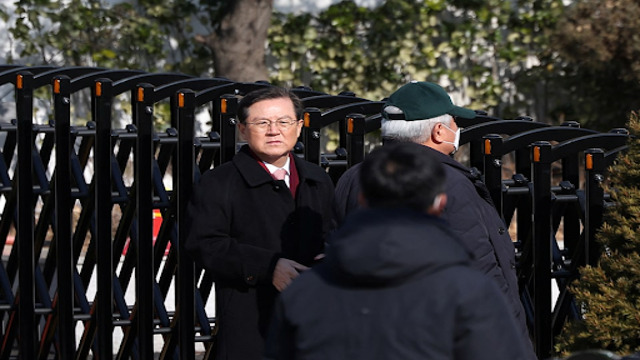
The lawyer for impeached South Korean President Yoon Suk Yeol, Yoon Kab-keun, was seen outside the former president's official residence in Seoul on January 3, 2025. This comes as Yoon faces the possibility of arrest following a court's approval of a warrant earlier in the week. Reuters
South Korea faced a tense standoff on Friday as investigators entered the compound of impeached President Yoon Suk Yeol to execute an unprecedented arrest warrant. Protesters and presidential security forces created a dramatic scene, highlighting the nation’s political crisis.
Authorities from the Corruption Investigation Office for High-ranking Officials (CIO), supported by police and prosecutors, arrived at Yoon's residence early in the morning. A bus and an armored vehicle initially blocked their entry, creating a tense delay. Once inside, they encountered resistance from the Presidential Security Service (PSS) and military personnel under PSS control.
Buses were stationed at the entrance of the official residence of impeached South Korean President Yoon Suk Yeol on January 3, 2025, as he faces possible arrest following a court's approval of an arrest warrant earlier this week. Reuters
The arrest warrant stems from Yoon’s controversial martial law declaration on December 3, which he claimed was necessary to address political instability and "anti-state forces." This move shocked the country, known as a vibrant democracy, and was quickly overturned by parliament. However, Yoon defended his actions, accusing political opponents of siding with North Korea and alleging election interference.
On January 3, 2025, police officers stood watch outside the official residence of impeached South Korean President Yoon Suk Yeol, who is facing a possible arrest after a court issued a warrant for his arrest earlier in the week. Reuters
The arrest attempt, a first for a sitting South Korean president, has further divided the nation. Hundreds of protesters gathered near Yoon’s residence, chanting slogans of support and calling the arrest warrant unlawful. “We have to block them with our lives,” one supporter exclaimed. Some waved flags symbolizing unity with the U.S., expressing hope that incoming American leadership would intervene.
On January 3, 2025, officials from the Corruption Investigation Office for High-ranking Officials gathered outside the official residence of impeached South Korean President Yoon Suk Yeol. Yoon is facing a possible arrest after a court issued a warrant for his arrest earlier in the week. Reuters
Yoon’s lawyer condemned the arrest warrant, calling it invalid and promising legal action. Meanwhile, the CIO has until January 6 to execute the warrant. If Yoon is taken into custody, he will likely be held at the Seoul Detention Center for up to 48 hours before investigators decide whether to request further detention or release him.
On January 3, 2025, vehicles thought to be carrying investigators from the Corruption Investigation Office for High-ranking Officials arrived at the official residence of impeached South Korean President Yoon Suk Yeol. Yoon is facing a possible arrest after a court issued a warrant for his detention. Reuters
The fallout from Yoon’s martial law declaration has already implicated several high-ranking officials. Former Defense Minister Kim Yong-hyun and army chief Park An-su face charges of insurrection and abuse of power for their roles in the decree. These developments highlight the severity of the situation, as insurrection is one of the few charges that strips a president of immunity in South Korea.
On December 12, 2024, South Korean President Yoon Suk Yeol gave a speech to the nation from the Presidential Office in Seoul. Reuters
In addition to the criminal investigation, Yoon's impeachment case is under review by the Constitutional Court. A second hearing is scheduled for later on Friday to determine whether he will be reinstated or permanently removed from office.
This political turmoil comes at a time of heightened public scrutiny and unrest. South Koreans are closely watching these events unfold, aware that the outcome will shape the nation’s future.















